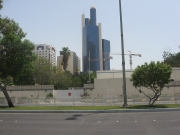
Government insiders have slammed the decision to ban Maccabi Tel Aviv fans from attending their team’s Europa League match at Aston Villa, calling the intelligence behind the
move “incredibly weak.”
A senior government source told Jewish News that the controversial ban is “almost certain to be overturned,” following growing backlash from ministers and community leaders.
On Thursday, it was announced that Israeli supporters would not be allowed to attend the November 6 match at Villa Park due to “safety concerns.” The decision was made by Birmingham’s Safety Advisory Group after West Midlands Police labeled the game “high risk,” citing “current intelligence and previous incidents,” including clashes during last year’s Europa League game between Ajax and Maccabi Tel Aviv in Amsterdam.
However, many inside government now believe the assessment was flawed and politically influenced. One source criticized officials for giving too much weight to lobbying from local MP Ayoub Khan, who has been vocal in his campaign to block Israeli fans.
Downing Street calls decision ‘wrong’
A Downing Street spokesperson said the Prime Minister was “angry” about the decision and is determined to see it reversed.
“The Prime Minister will do everything in his power to give Jewish communities the security they deserve,” the spokesperson said. “Football has always been a unifying force. Everyone should be able to attend a match without fear of violence or intimidation—whatever their religion, nationality, or background.”
Culture Secretary Lisa Nandy is expected to challenge the intelligence assessment in a meeting with Home Office officials, while Birmingham City Council is reportedly considering legal action to overturn the ban. Council leader John Cotton has already expressed his opposition in talks with police chiefs.
Questionable intelligence and political pressure
Critics say the ban ignored key evidence—most notably a report submitted last week by Lord Mann, the government’s independent adviser on antisemitism. In his letter, Lord Mann argued that portraying Maccabi supporters as inherently violent was “misleading and unfair.”
“Maccabi fans have previously played in London—against Chelsea in 2015 and Stoke in 2011—without a single incident,” noted one government insider. “Even Villa Park has hosted high-risk European fixtures, including their 2025 match against RB Leipzig, safely and without problems.”
Sources close to the matter say there is no intelligence suggesting that any fans involved in past incidents in Amsterdam planned to travel to Birmingham. Maccabi were expected to bring about 1,500 supporters, including many UK-based Israelis, under strict ticketing and police escort arrangements.
Political tensions in Birmingham
The controversy has also reignited criticism of local MP Ayoub Khan. Khan, who has campaigned for the fan ban, insists his stance is about safety—not antisemitism or anti-Israel sentiment.
“We cannot conflate antisemitism with what some fans did in Amsterdam in 2024,” he told BBC Newsnight. “This is about violent fans, and the Prime Minister should stay out of operational matters.”
But security officials say Khan’s campaign may have actually increased risks, drawing attention and anger from Aston Villa supporters and Jewish community members.
“The biggest concern isn’t Maccabi fans,” said one source. “It’s managing potential clashes between Villa fans and Khan’s small group of anti-Israel protesters.”
Growing pressure to reverse the ban
Government ministers from across departments have lined up to condemn the move.
Keir Starmer called it “the wrong decision,” Kemi Badenoch branded it “a national disgrace,” and Ian Murray, from the Department for Culture, Media and Sport, said it was “completely unacceptable.”
Birmingham City Council is also worried the decision could set a dangerous precedent ahead of major events such as next year’s European Athletics Championships—where Israeli athletes are expected to compete—and Euro 2028, for which Villa Park is a confirmed venue.
Meanwhile, other European football authorities have taken similar steps in recent months, restricting travel for Ajax and Eintracht Frankfurt fans to high-risk away matches in Marseille and Naples. But many believe this situation is different—driven more by politics than by genuine safety concerns. Photo by Arne Müseler, Wikimedia commons.







































